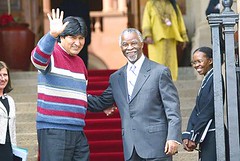
President Evo Morales of Bolivia With South African President Thabo Mbeki
Originally uploaded by Pan-African News Wire Photo File
An overwhelming majority of Beni and Pando voters said yes to autonomy
Bolivians in two opposition-controlled states have voted overwhelmingly for autonomy measures that aim to shield the country's remote Amazon basin from the populist reforms of the president, Evo Morales.
Morales's quest to empower Bolivia's long-oppressed Indian majority has alienated the east's more mixed-race population, fuelling old regional grudges against a government long heavily centred in the western capital of La Paz.
Voters in the Amazonian states of Beni and Pando passed autonomy measures on Sunday by more than 80 per cent, according to preliminary vote counts released on Sunday evening.
But the votes, organised by the states' pro-autonomy governments, were not monitored by impartial international observers and the totals also showed 34 per cent of Beni voters abstained, as government officials had encouraged Morales's supporters to do.
State leaders hailed the measure as the latest step in a growing decentralisation push that opposition groups hope will provide a counterbalance to Morales's leftist federal government.
"Democracy won't be stopped, we want to live in a democratic country, we want to maintain that democracy, we also want to pass the message that we cannot close our eyes and ears to what's going on," Ernesto Suarez, the Beni governor, said after casting his vote.
"These processes are irreversible and the government, above all, must listen to the voice of the people," he said.
Deep regional ties have allied rural Beni and Pando - among Bolivia's poorest states - with their neighbour Santa Cruz, Bolivia's wealthiest province and a hotbed of anti-Morales sentiment where 86 per cent of voters opted for autonomy earlier this month.
Politically charged goals
While the autonomy declarations call for steps toward a federalist model similar to the United States, including the creation of locally elected state assemblies, they also seek more politically charged goals.
Statutes passed in Santa Cruz and on the ballot in Beni and Pando would protect huge cattle ranches and soya plantations from expropriation under Morales's ambitious land reform.
Santa Cruz also voted to withhold a bigger share of its natural gas reserves, which Morales needs to finance his reforms, although the state has yet to enforce the rule.
Morales has dismissed all three referendums as illegal "surveys" conducted by conservative opposition groups hoping to cripple his government.
A fourth state, Tarija, which has most of the country's natural gas reserves, is scheduled to join the trend with a June 22 referendum.
The autonomy movement also has stolen momentum from Morales's central project: a draft constitution that would grant indigenous groups greater power.
While that document languishes on the shelf - it cannot become law until approved in a still-unscheduled national referendum - the eastern lowland states are racing to sell Bolivians on their rival vision of a decentralised country.
No comments:
Post a Comment